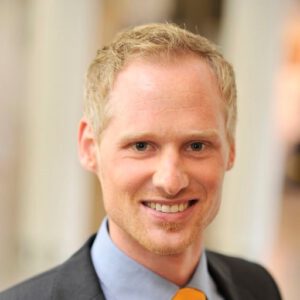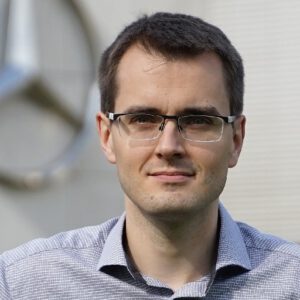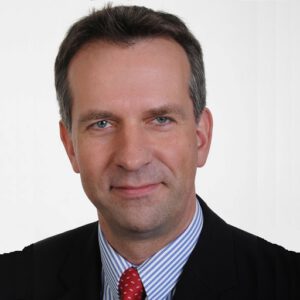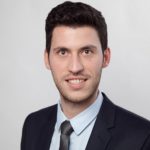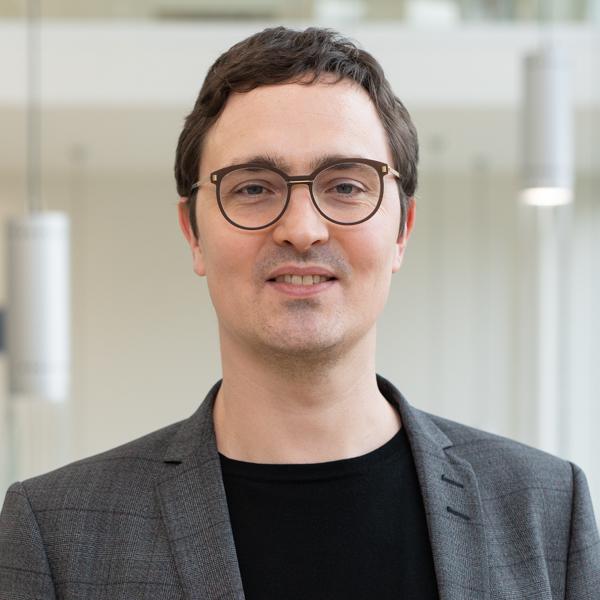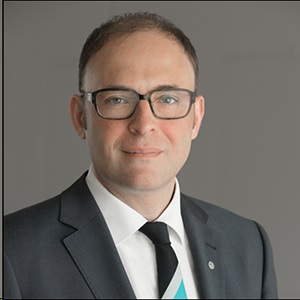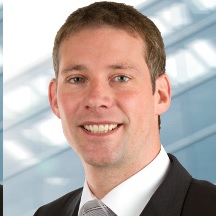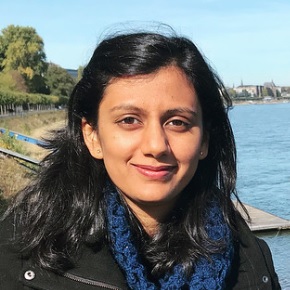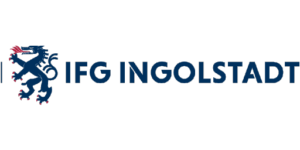| 08:45–09:00 | Opening |
| 09:00–10:00 | Keynote: Artificial Intelligence in Automotive Engineering
Dr.-Ing. Steven Peters (Mercedes Benz AG) |
| 10:00–11:00 | Full Paper Session: AI, Evaluation and Testing- MonoComb: A Sparse-to-Dense Combination Approach for Monocular Scene FlowRené Schuster (DFKI), Christian Unger (BMW), Didier Stricker (DFKI)
- Frenet Coordinate Based Driving Maneuver Prediction at Roundabouts Using LSTM NetworksCarina Vogl (Audi), Moritz Sackmann (Friedrich-Alexander-Universität Erlangen), Ludwig Kürzinger (Technische Universität München), Ulrich Hofmann (Audi)
- A Self-Supervised Feature Map Augmentation (FMA) Loss and Combined Augmentations Finetuning to Efficiently Improve the Robustness of CNNsNikhil Kapoor (Volkswagen AG), Chun Yuan (Volkswagen AG), Jonas Löhdefink (Technische Universität Braunschweig), Roland Zimmerman (Universität Goettingen), Serin Varghese (Volkswagen AG), Fabian Hüger (Volkswagen Group Automation), Nico M. Schmidt (Volkswagen AG), Peter Schlicht (Volkswagen Group Research), Tim Fingscheidt (Technische Universität Braunschweig)
- DNN Analysis through Synthetic Data VariationQutub Syed (INTEL LABS), Oliver Grau (Intel), Korbinian Hagn (Intel)
- Distributed Model-Free Ride-Sharing Algorithm with Pricing using Deep Reinforcement LearningMarina W. Haliem (Purdue University), Ganapathy Mani (Purdue University), Vaneet Aggarwal (Purdue University), Bharat Bhargava (Purdue University)
|
| 11:00–12:15 | Extended Abstract Session: Spotlights- Self-Supervised Monocular Depth Estimation: Solving the Dynamic Object Problem by Semantic GuidanceMarvin Klingner (Technische Universität Braunschweig ), Jan-Aike Termöhlen (Technische Universität Braunschweig), Jonas Mikolajczyk (Technische Universität Braunschweig), Tim Fingscheidt ( Technische Universität Braunschweig)
- Segmentations-Leak: Membership Inference Attacks and Defenses in Semantic Image SegmentationYang He (CISPA Helmholtz Center for Information Security), Shadi Rahimian (CISPA Helmholtz Center for Information Security), Bernt Schiele (MPI Informatics), Mario Fritz (CISPA Helmholtz Center for Information Security)
- Robust Semantic Segmentation by Redundant Networks With a Layer-Specific Loss Contribution and Majority VoteAndreas Bär (Technische Universität Braunschweig), Marvin Klingner (Technische Universität Braunschweig ), Serin Varghese (Volkswagen AG), Fabian Hüger (Volkswagen Group Automation), Peter Schlicht (Volkswagen Group Research), Tim Fingscheidt ( Technische Universität Braunschweig)
- Haar Wavelet based Block Autoregressive Flows for TrajectoriesApratim Bhattacharyya (Max Planck Institute for Informatics), Christoph-Nikolas Straehle (Bosch Center for Artificial Intelligence), Mario Fritz (CISPA Helmholtz Center for Information Security), Bernt Schiele (MPI Informatics)
- Safety Concerns and Mitigation Approaches Regarding the Use of Deep Learning in Safety-Critical Perception TasksShervin Raafatnia (Bosch), Stephanie Abrecht (Robert Bosch GmbH), Sebastian Sudholt (Robert Bosch GmbH)
- Adversarial Attacks on Speech Recognition Systems: Language Bias in LiteratureKarla Markert (Fraunhofer AISEC), Donika Mirdita (Fraunhofer AISEC), Konstantin Böttinger (Fraunhofer AISEC)
- FlexPool: A Distributed Model-Free Deep Reinforcement Learning Algorithm for Joint Passengers \& Goods TransportationKaushik Bharadwaj Manchella (Purdue University), Abhishek Kumar Umrawal (Purdue University), Vaneet Aggarwal (Purdue University)
- Joint Detection and Tracking for Efficient Scene UnderstandingIssa Mouawad (University of Genoa), Francesca Odone ("University of Genova, Italy")
- DNN Optimization in Low-Power Speech ProcessingMunir Georges (THI)
- Towards Automated Testing and Robustification by Semantic Adversarial Data GenerationRakshith Shetty (Max Planck Institute of Informatics), Mario Fritz (CISPA Helmholtz Center for Information Security), Bernt Schiele (MPI Informatics)
- Characterizing Data Sets for training and validation in automated drivingPeter Nöst (Intel), Korbinian Hagn (Intel), Oliver Grau (Intel)
- Increasing realism of synthetic datasets through additive sensor and lens artefactsKorbinian Hagn (Intel), Oliver Grau (Intel)
- Cyber-Secure City Transport EcosystemAndrew J. Roberts (Tallinn University of Technology)
|
| 12:15–13:15 | - Breakout Session for Discussion - |
| 13:15–14:15 | Keynote: Recent Methods from Computer Vision for Perception in Highly Automated Driving
Prof. Dr.-Ing. Tim Fingscheidt (TU Braunschweig) |
| 14:15–15:30 | Full Paper Session: Security- Privacy by Design: Survey on Capacitive Proximity Sensing as System of Choice for Driver Vehicle InterfacesSebastian Frank (TU Darmstadt), Arjan Kuijper (Fraunhofer Institute for Computer Graphics Research IGD and Mathematical and Applied Visual Computing Group, TU Darmstadt)
- Transport Layer Scanning for Attack Surface Detection in Vehicular NetworksNils H. Weiss (University of Applied Sciences Regensburg)
- A Hybrid Model for Safety and Security Assessment of Autonomous VehiclesRhea Rinaldo (German Research Center for Artificial Intelligence (DFKI)), Timo F. Horeis (Institut für Qualitäts- und Zuverlässigkeitsmanagement GmbH)
- Grey-box Analysis and Fuzzing of Automotive Electronic Components via Control-Flow Graph ExtractionAndreea-Ina Radu (University of Birmingham), Flavio Garcia (University of Birmingham)
- Autonomous Vehicles: Data Protection and Ethical ConsiderationsIoannis Krontiris (Huawei Technologies), Kalliroi Grammenou (Luxembourg Data Protection Authority), Kalliopi Terzidou (Leiden University), Marina Zacharopoulou (University of Bologna), Marina Tsikintikou (University of Luxembourg), Foteini Baladima (Rheinische-Friedrich-Wihlelms University of Bonn), Chrysi Sakellari (Toyota Motor Europe), Konstantinos Kaouras (University College London)
- Security Analysis of Automotive ProtocolsTimm Lauser (Hochschule Darmstadt), Daniel Zelle (Fraunhofer SIT), Christoph Krauß (Fraunhofer SIT)
- HIP-20: Integration of Vehicle-HSM-Generated Credentials into Plug-and-Charge InfrastructureAndreas Fuchs (Fraunhofer SIT), Dustin Kern (Fraunhofer SIT), Christoph Krauß (Fraunhofer SIT), Maria Zhdanova (Fraunhofer SIT), Ronald Heddergott (Carmeq GmbH)
|
| 15:30–16:00 | - Breakout Session for Discussion - |
| 16:00–17:00 | Keynote: Cyber Security Challenges & Solutions in the Automotive Industry
Dr.-Ing. Mathias Dehm (Continental) |
| 17:00–17:15 | Closing |
